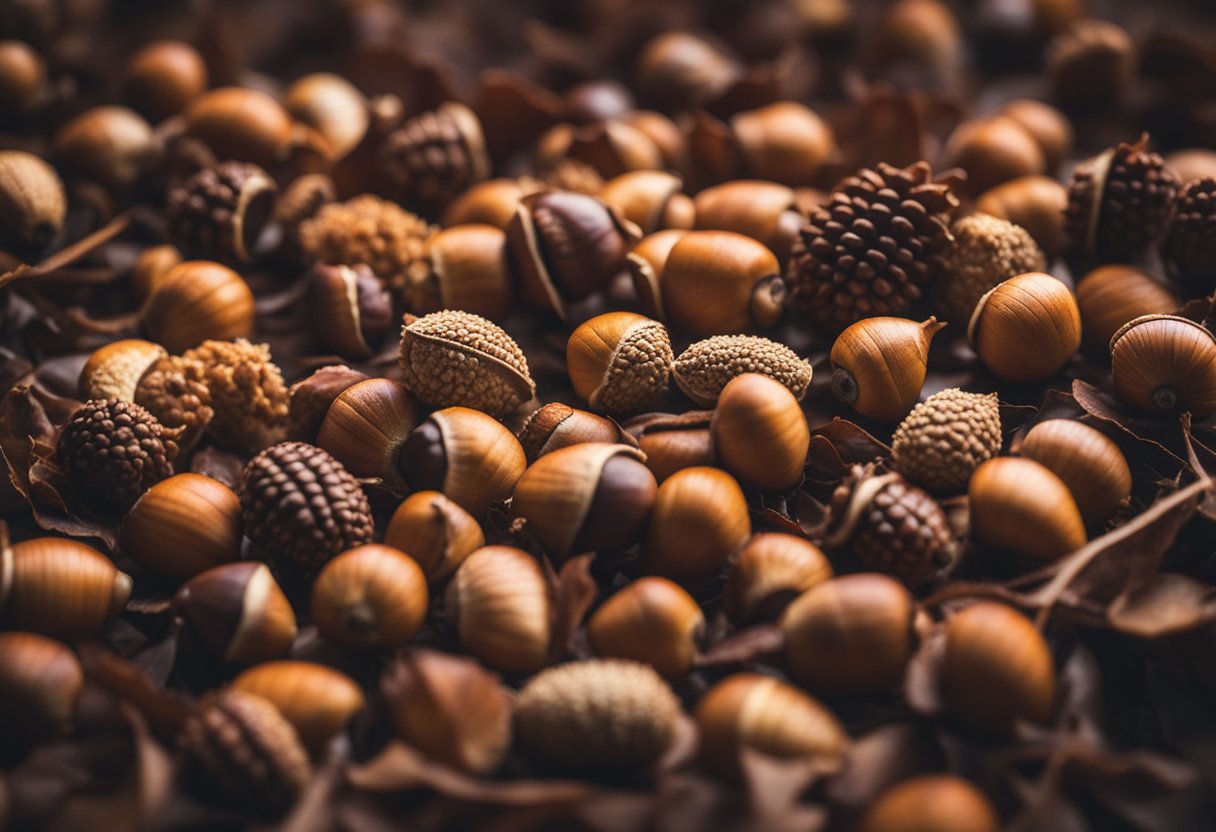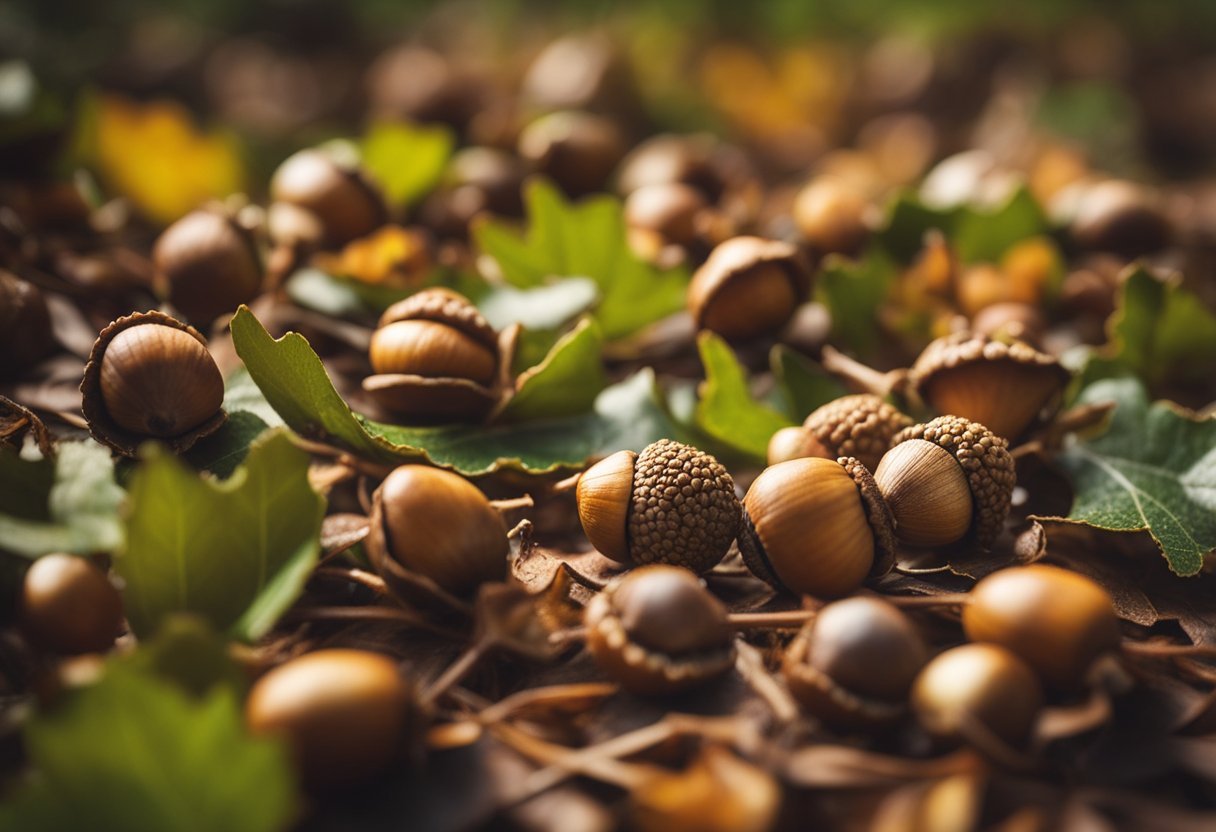As an Amazon Associate I earn from qualifying purchases.
At A Glance
Yes, you can compost acorns. Acorns are organic material and will eventually break down in a compost pile. However, they are hard and may take longer to decompose compared to other compost materials. To expedite the composting process, it’s advisable to crush or grind the acorns into smaller pieces before adding them to your compost pile. Moreover, acorns contain tannins, which can be toxic to some plants in large quantities, but the composting process can help to break down these tannins.
Composting is an excellent way to reduce waste and create nutrient-rich soil for your plants. However, not all materials are suitable for composting. One material that often causes confusion is acorns. Many gardeners wonder whether they can compost acorns and, if so, how to do it properly.

The good news is that acorns can be composted, but there are some things to keep in mind. Acorns are considered brown materials and provide a good source of carbon for your compost pile. However, they are quite dense and take longer to break down compared to other compostable items. Proper preparation is key to successfully composting acorns.
Understanding Acorns and Their Composition

Acorns and Oak Trees
Acorns are the fruit of oak trees. They are typically small, round, and brown in color. Oak trees produce acorns every year, but the amount can vary depending on the year. In some years, oak trees produce a large amount of acorns, while in other years, they produce very few.
Nutrient Content of Acorns
Acorns are a good source of nutrients for composting. They contain protein, vitamins, and minerals that can help improve the quality of your compost. However, it is important to note that acorns are high in tannins, which can be harmful to some plants if not properly composted.
To properly compost acorns, it is recommended to first soak them in water for a few days to leach out the tannins. After soaking, acorns can be added to your compost pile as a brown material. They provide a good source of carbon for your compost pile and can help balance out the nitrogen-rich green materials.
Overall, acorns are a valuable addition to your compost pile as long as they are properly prepared. By soaking them first, you can ensure that they will not harm your plants and that they will provide valuable nutrients to your compost.
The Composting Process
Composting is a natural process of recycling organic materials into a rich, dark, and crumbly soil amendment called compost. The process involves breaking down organic materials into simpler compounds, with the help of microorganisms and other decomposers. In this section, I will discuss the composting process and how to compost acorns.
Green and Brown Materials
Composting requires two types of organic materials: green and brown. Green materials are high in nitrogen and include fresh grass clippings, fruit and vegetable scraps, and coffee grounds. Brown materials are high in carbon and include dry leaves, straw, and wood chips. It’s important to have a balance of green and brown materials in your compost pile to ensure proper decomposition.
Layering in Composting
Layering is an important step in the composting process. Start by adding a layer of brown materials to the bottom of your compost bin or pile. Then add a layer of green materials on top. Continue layering brown and green materials until your bin or pile is full. It’s important to keep the layers moist but not too wet, as excess moisture can slow down the decomposition process.
Decomposition Process
The decomposition process begins as soon as you start layering your organic materials. Microorganisms, such as bacteria and fungi, break down the materials into simpler compounds. As the materials break down, they generate heat, which helps to speed up the process. Over time, the materials will turn into a rich, dark, and crumbly soil amendment called compost.
When composting acorns, it’s important to break down the tough outer shell to speed up the decomposition process. Gather all the acorns from your yard and spread them over the driveway. If you have a small amount, smash them with a hammer to crack them open and expose the meat inside. Acorns are considered brown materials and provide a good source of carbon for your compost pile. However, it’s important to avoid adding an excessive amount of acorns to your compost bin at once, as it can potentially make the compost too acidic, disrupting the overall balance needed for effective decomposition.
In conclusion, composting is a natural process that requires a balance of green and brown materials, layering, and proper moisture levels. When composting acorns, it’s important to break down the shells and avoid adding an excessive amount to your compost pile at once. With these tips, you can create a rich, dark, and crumbly soil amendment that will benefit your garden and the environment.
Composting Acorns

As a gardener, I have often wondered if acorns can be added to a compost pile. After conducting some research, I have found that acorns can indeed be composted. However, there are some things to keep in mind when composting acorns.
Preparation of Acorns
Before adding acorns to the compost pile, it is important to prepare them properly. Acorns contain tannins, which can be harmful to plants if not broken down. To prepare acorns for composting, they should be soaked in water for several days to leach out the tannins. After soaking, the acorns should be spread out to dry in the sun for a few days. Once dry, the acorns can be crushed or ground up to speed up the decomposition process.
Adding Acorns to Compost
Acorns can be added to the compost pile as a brown material. They are considered a good source of carbon and can help balance out the nitrogen-rich green materials in the pile. When adding acorns to the compost pile, it is important to break them up into smaller pieces to help speed up the decomposition process.
Mixing and Turning Compost
To ensure that the acorns and other composting materials break down properly, it is important to mix and turn the compost regularly. This helps to distribute moisture and oxygen throughout the pile, which is essential for the decomposition process. A rake or shovel can be used to mix and turn the compost pile.
Overall, composting acorns is a great way to dispose of them in an environmentally friendly way while also adding valuable nutrients to your garden soil. By properly preparing the acorns, adding them to the compost pile as a brown material, and regularly mixing and turning the pile, you can create a nutrient-rich compost that will benefit your garden.
Benefits and Challenges of Composting Acorns
As a brown material, acorns provide a good source of carbon for your compost pile. Composting acorns can offer several benefits, including waste reduction by diverting them from landfills and reducing the amount of organic waste that ends up in waste disposal sites.
Nutrient-Rich Soil
Composting acorns can create nutrient-rich soil that can be used to nourish plants. Acorns are rich in vitamins A, C, and K, which are essential for the growth of many plants. Acorns can also be used as a source of calcium, which is important for strong cell walls in plants.
Tannin Content in Acorns
Acorns contain tannins that can slow down the decomposition process. While composting acorns is generally safe, it’s important to be aware of acorn toxicity and potential soil contamination. Moderation is key when adding acorns to your compost bin, as a large quantity of acorns can potentially make the compost too acidic, disrupting the overall balance needed for effective decomposition.
Use of Composted Acorns in Landscaping
Composted acorns can be used in landscaping to enrich the soil and promote healthy plant growth. Acorn shells can also be used as mulch to help retain moisture in the soil and suppress weeds. When using composted acorns in landscaping, it’s important to ensure that the soil pH is balanced and that the compost has been allowed to fully decompose before use.
In summary, composting acorns can provide nutrient-rich soil for plants and help reduce waste in landfills. However, it’s important to be aware of the tannin content in acorns and to use moderation when adding them to your compost bin. Composted acorns can also be used in landscaping to promote healthy plant growth and suppress weeds.
Sure, here’s the section:
Additional Tips for Composting Acorns
If you’re looking to compost acorns, there are a few additional tips you can follow to ensure the process goes smoothly. Here are some tips to consider:
Use of Kitchen Waste
One great way to compost acorns is to mix them with kitchen waste. Kitchen waste such as vegetable scraps, eggshells, and coffee grounds are considered green ingredients and can help balance the brown ingredients found in acorns. By adding kitchen waste to your compost pile, you can help speed up the decomposition process and create nutrient-rich compost for your garden.
Composting with Grass Clippings
Grass clippings are another great green ingredient that can help balance the brown ingredients found in acorns. By mixing grass clippings with acorns, you can create a compost pile that is rich in nitrogen and other essential nutrients. However, it’s important to note that you should only add grass clippings to your compost pile if they are free of pesticides and other harmful chemicals.
Adding Shredded Newspaper to Compost
Shredded newspaper is a great brown ingredient that can help balance the green ingredients found in acorns. By adding shredded newspaper to your compost pile, you can help create a compost pile that is rich in carbon. However, it’s important to note that you should only add newspaper that is printed with soy-based ink and not glossy or colored paper.
Overall, composting acorns can be a great way to create nutrient-rich compost for your garden. By following these additional tips, you can help speed up the composting process and create high-quality compost that will help your garden thrive.
